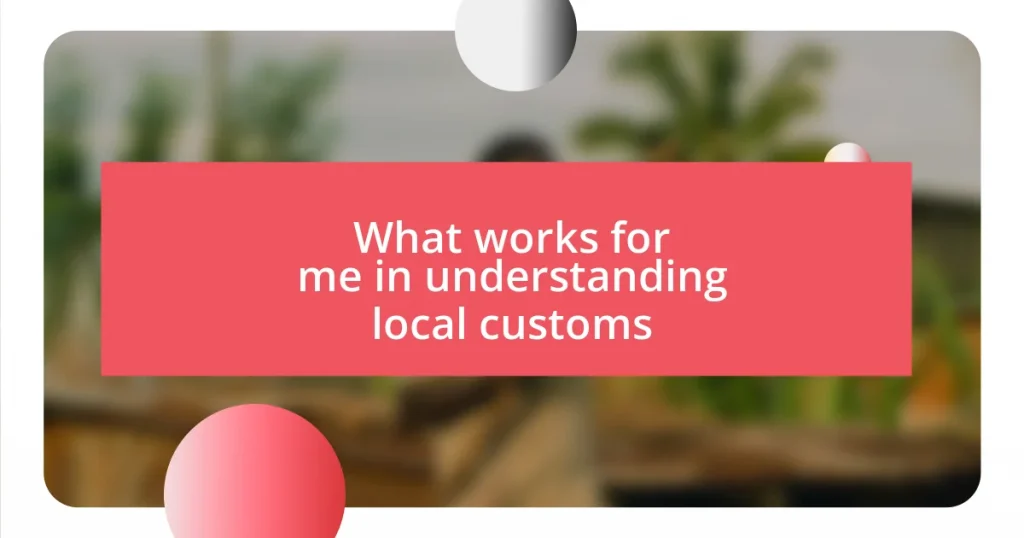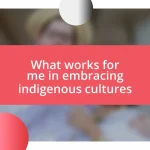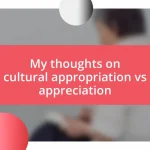Key takeaways:
- Engaging with locals through conversation, social media, and participation in cultural traditions leads to a deeper understanding of customs and community connections.
- Researching cultural norms via local literature, documentaries, and academic resources enriches one’s perspective and appreciation for diverse societies.
- Practicing language basics and adapting to social etiquette fosters respect and bridges gaps, enhancing travel experiences and personal connections.

Identifying Local Customs Sources
When I travel, I always start by chatting with locals. You’d be surprised at how much you can learn over a simple cup of coffee or tea. Have you ever noticed how a casual conversation can reveal the heart of a culture? These dialogues not only offer firsthand stories but also insight into customs that books or websites might overlook.
Social media is also a goldmine for understanding local traditions. I remember scrolling through Instagram while preparing for a trip to Japan and stumbling across a local festival’s hashtag. Engaging with the posts and following the conversations led me to uncover rituals and events that enriched my experience immensely. Don’t you think following these online communities can make you feel more connected, even before you arrive?
Additionally, I find local markets to be vibrant hubs where customs breathe life into the everyday. Wandering through a bustling market in Mexico, I felt the rhythm of the culture—the aromas, the music, the laughter. It struck me then: customs are not just things to learn about; they are lived experiences that embody warmth and connection. Have you felt that same thrill when discovering a new place? It’s almost like stepping into a living story.

Researching Cultural Norms
When diving into the intricacies of cultural norms, diligent research becomes essential. One of the most enlightening experiences I’ve had was reading local literature. I remember picking up a collection of short stories from a bookstore in Morocco. Each tale not only entertained me but also unfolded layers of cultural values and social norms that I had never considered previously. Engaging with local authors can provide a profound understanding of the nuances that shape everyday life.
To effectively research cultural norms, consider these strategies:
- Explore books by local authors: Their narratives offer rich insights into societal values and issues.
- Check university resources: Academic articles often analyze cultural practices in depth.
- Watch documentaries: These visual stories can vividly showcase customs and traditions.
- Participate in virtual tours: Online platforms sometimes host live experiences that allow you to interact and learn in real-time.
- Visit local libraries when you arrive: They often have materials curated specifically for visitors.
By employing these approaches, I feel a deeper connection to the cultures I explore, transforming research into a personal journey of understanding.

Learning Language Basics
One of the first steps I take when immersing myself in a new culture is learning the basics of the local language. Just a few simple phrases can make all the difference. When I traveled to Italy, saying “Buongiorno” instead of just “Hello” instantly brought smiles and warmth from the locals. It’s amazing how a small effort can break down barriers and foster connections. Don’t you find that speaking even a little of the local language can enhance your travel experiences?
I often recommend using language learning apps for vocabulary building. These platforms usually have gamified elements that make learning feel less daunting. I recall using an app before my trip to Thailand, and I was pleasantly surprised by how many words I retained. It felt empowering to order street food in Thai, turning an ordinary meal into an interactive experience. Did you know that even mastering basic greetings can lead to deeper conversations and a greater understanding of customs? It certainly did for me.
Conversing with locals in their language is a significant aspect of understanding cultural nuances. While visiting France, I made it a point to learn phrases that reflect politeness and respect, like “s’il vous plaît” and “merci.” This not only helped me navigate everyday situations but also showed that I cared about their culture. What insights have you gained from trying to communicate in another language? It’s fascinating how learning a few words can introduce you to the essence of local customs.
| Language Basics | Impact on Travel |
|---|---|
| Saying Hello | Opens doors to warm interactions |
| Using Apps | Makes learning fun and effective |
| Learning Polite Phrases | Shows respect for the culture |
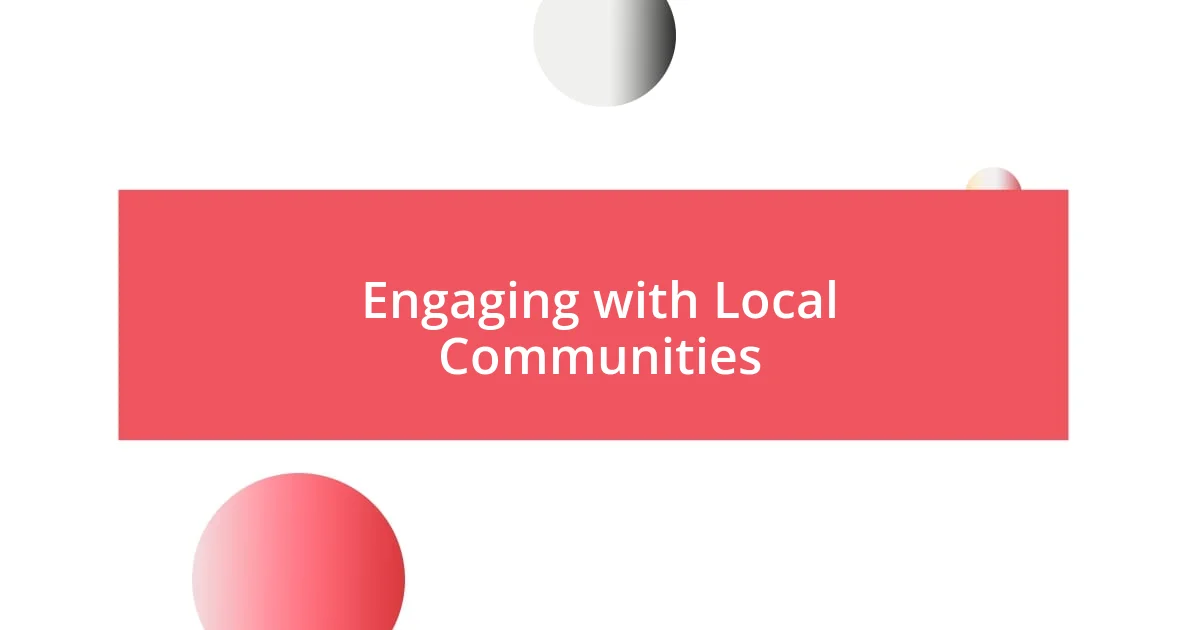
Engaging with Local Communities
Engaging with local communities can be a transformative experience. I remember sitting in a small café in a lesser-known part of Colombia, trying to strike up a conversation with the barista. It was amazing how sharing my love for coffee led to discussions about local farming practices. That moment opened my eyes to the impact of community-driven agriculture. Have you ever felt that connecting over a shared interest creates an invisible bridge?
In my travels, I’ve found that attending local events or festivals can be a gateway to deeper engagement. I attended a folk festival in Romania, and it felt like stepping into a living history book. Dancing with locals and experiencing traditional music created bonds that transcended language barriers. I often think, how can these moments remind us of our shared humanity? It’s heartwarming to see how collective cultural pride fosters relationships.
Volunteering with community projects has also been a rewarding way to engage. During a trip to South Africa, I spent time helping in a local school, which allowed me to immerse myself in their daily life. The children’s laughter and stories were enlightening, offering insights into their customs and challenges. I often ask myself: how does contributing to a community change your perspective on their culture? For me, it deepened my appreciation and made me feel like a part of something bigger.
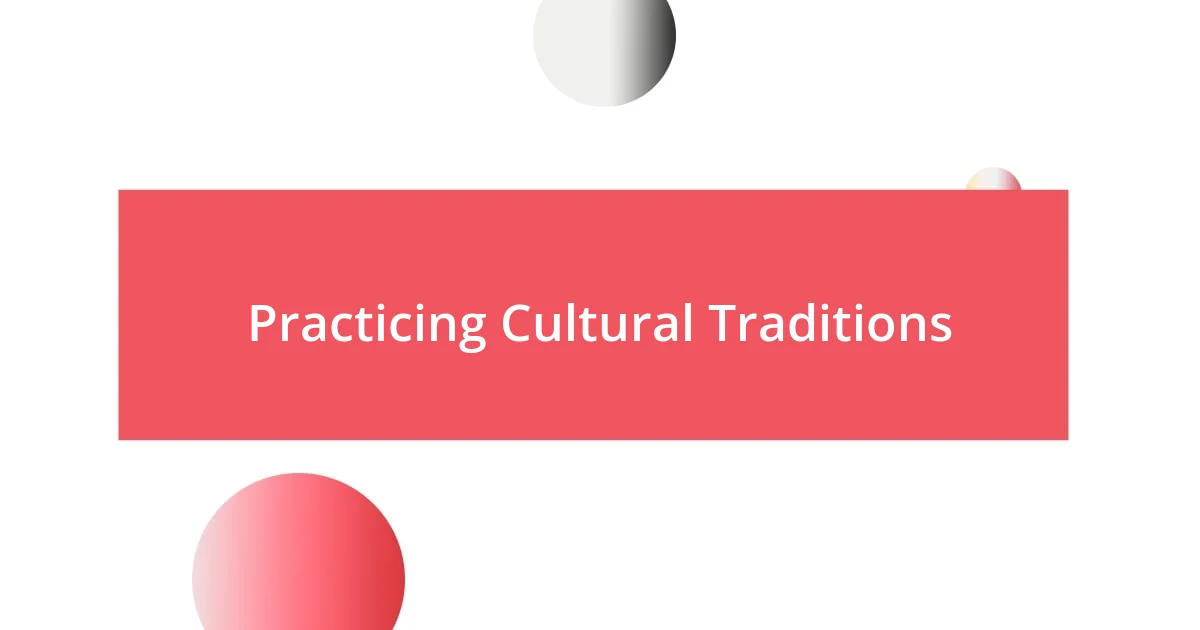
Practicing Cultural Traditions
Practicing local cultural traditions is a beautiful way to connect with a place and its people. I vividly recall participating in a traditional tea ceremony in Japan, where every detail held meaning—a nod to respect and mindfulness that permeated the air. As we moved through the precise steps, I wasn’t just an observer; I felt like I was weaving myself into the fabric of their culture. Have you ever felt transformed by experiencing a local ritual? It made me realize that traditions are like stories that demand to be shared.
During my trip to Mexico, I joined a local family in preparing a traditional dish for Día de los Muertos. While chopping vegetables and mixing spices, I listened to their stories about loved ones they had lost. The experience taught me that cooking is often about much more than just food; it’s a way to honor loved ones and keep memories alive. How often do we overlook the significance of food in cultural practices? Sharing that meal felt not only nourishing but deeply poignant—it was a tribute wrapped in rich flavors.
I also had the chance to dance in a local festival in India, which was both exhilarating and humbling. Each movement had a story, connecting me with generations past. As I danced alongside locals, I could sense the joys and struggles embedded in their expressions. Isn’t it interesting how dance can serve as a universal language? Even as a newcomer, I felt bonded by our shared rhythm, reminding me that traditions have an incredible power to unite us across cultures.

Adapting to Social Etiquette
Adapting to social etiquette in different cultures has always been an adventure for me. During a trip to Thailand, I quickly learned the importance of the “wai”—a respectful greeting where you place your palms together in a prayer-like gesture and bow your head slightly. The first time I tried it, I felt clumsy, but seeing the locals light up with a smile made me realize how small gestures can create a warm connection. Have you ever noticed how a simple action can communicate respect in ways words sometimes can’t?
In Italy, dining etiquette was another lesson in itself. I remember being slightly shocked when my host insisted that I wait for the eldest person at the table to start eating before I touched my plate. It was a wonderful illustration of honoring the family structure and traditions. This experience made me reflect on how our social rituals, no matter where we are, are often rooted in values—something I now strive to honor. Have you considered how understanding these nuances can enhance your travel experiences?
There’s also the subtle art of gift-giving that varies greatly from place to place. In South Korea, for example, presenting a gift with both hands is a sign of respect. I recall my nerves when I presented a small token to my new friends there, anxiously mimicking their gestures. Their warm reception was a reminder that being mindful of such customs opens doors to deeper friendships. Don’t you find it fascinating how the simplest acts can speak volumes in connections?
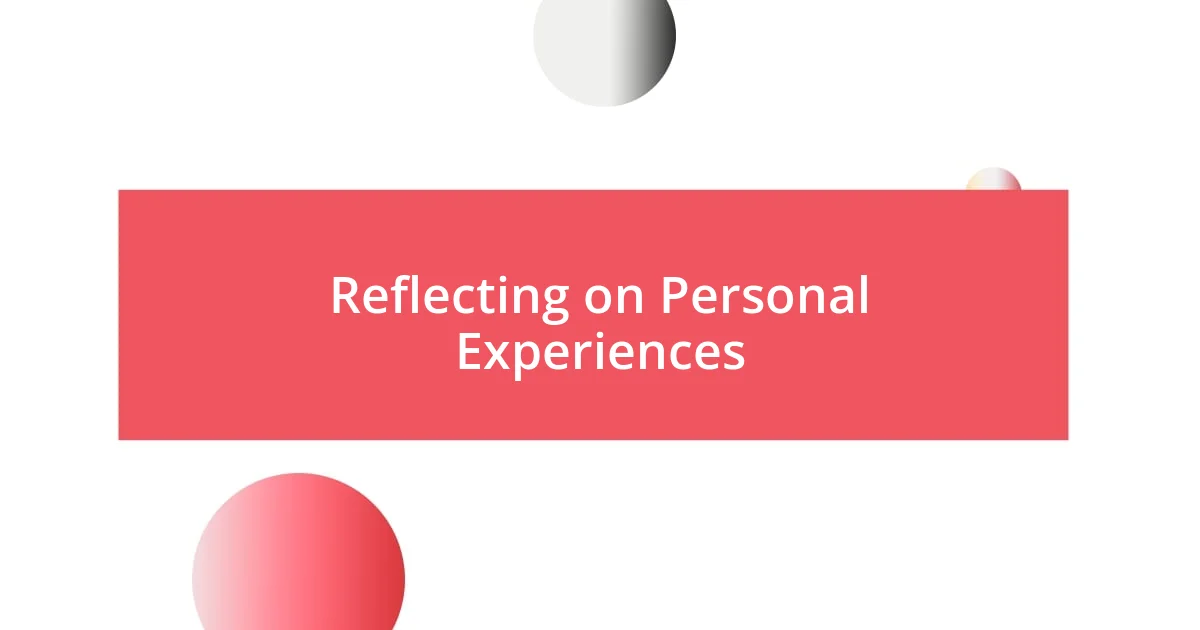
Reflecting on Personal Experiences
Reflecting on my personal experiences with local customs often brings back vivid memories of moments that shaped my understanding. For instance, while exploring the bustling streets of Marrakech, I stumbled upon a small bazaar where a shopkeeper invited me to try my hand at calligraphy. As I struggled to mimic the flowing Arabic letters, he smiled and offered gentle encouragement. This interaction highlighted how much cultural knowledge can be shared through simple acts of kindness—don’t you think that the willingness to share one’s craft can create a wonderful bridge between different worlds?
I once attended a local wedding in Greece where I was swept up in the joyous atmosphere. The music filled my senses, and the vibrant dance moved my feet before my mind could catch up. As I joined the circle dance, I felt a deep sense of belonging, even as an outsider. This experience reminded me that participating in ceremonies, even as an observer, allows us to connect with the essence of the place. Have you ever felt such a connection that seemed to transcend language and background?
Looking back at celebrations in various countries, I remember a lively festival in Brazil that transformed me. The exuberance of Carnival with its colorful costumes and infectious energy enveloped me. I was hesitant at first, unsure if my movements matched the rhythm of the samba. Yet, the locals welcomed me with open arms, making me feel like a part of something much bigger than myself. Isn’t it incredible how engaging with local customs can foster a sense of community that transcends cultural differences? This realization continues to inspire my travels, encouraging me to immerse myself fully in every experience.










